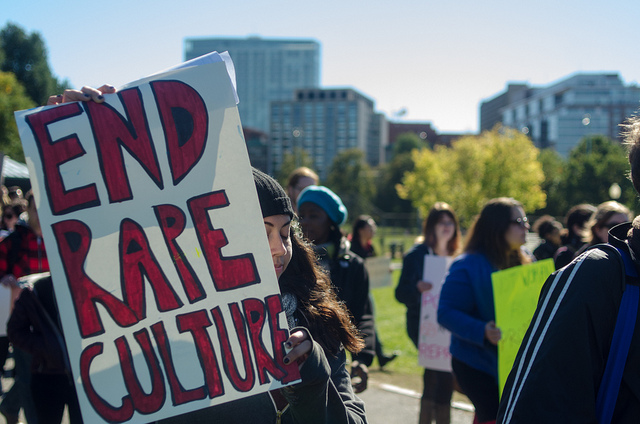
I have zero sympathy for Brock Turner. He has made his bed and may he lie in his reeking, soiled sheets for a long time to come.
But Turner is not a lone villain. He is the manifestation of disease incubated in a sick society. In some ways, he too is a victim of this sickness.
The Stanford rape case has caused a justifiable outcry, but that’s because Turner’s victim had the courage to read an open letter in court about how his actions affected her. Had she not done so, chances are that it would have fallen under the radar—one of so many unjust outcomes.
Instead, she has sparked an outrage that could potentially lead to a change in the collective consciousness of a culture that allows rape and sexual assault to be an everyday occurrence.
It just might be time we stop dismissing bad behaviour with, “Boys will be boys.”
All boys can be taught to behave better, if those responsible for their welfare have the intent to teach—and model—those principles.
Children see something they want, and they take it—until they are taught that not everything is theirs to take; until they’re taught to ask permission; until they’re taught that they can’t always have what they want.
But somehow, not every boy is taught to respect the bodily integrity of girls, not every man-in-training is taught to respect women. Their parents (and society) simply expect boys to be driven by their sexual urges and instead teach girls to protect themselves against that.
And then we’re all set free to make our way in the world—which generally involves experimentation with drink, drugs and our sexuality. But the responsibility for ensuring that no one is sexually assaulted in the middle of all that experimentation is always laid at women’s feet.
The actions of men may be decried as unacceptable, but excuses are still made—and women are blamed much more than men. (At worst, women are somehow “asking for it”—at best, they are irresponsible to put themselves in a situation where it might happen.)
Women are judged as reckless or foolish for getting in the way of men who choose not to control their “natural” urges.
Of course, not every man is a would-be rapist. There are plenty of good men out there who have been raised to respect women. However, there are too many men out there who don’t even understand how their attitudes and behaviors make them sexual predators. And there are too many who don’t even care if that’s true of them.
Every man may not be a threat to women. But rape culture—which is endemic in modern Western society—is a threat to every girl and woman (and many boys and men).
Rape culture is a double-standard where the emphasis is on teaching women to protect themselves against the possibility of rape, instead of teaching men not to do it. Rape culture is set up in such a way that it is easy to commit such a crime and get away with it. Rape culture is a culture where young boys, who genuinely don’t know any better, are allowed to grow into men who will assault women (and other men). They do so because they don’t give a f*ck about the rights or bodily integrity of others.
And they don’t give a f*ck, because nobody taught them to.
There is a spiritual teaching that we are all doing the best we can, from the place where we’re at. If we are going to overcome this (or any other) societal problem, then we need to understand why it exists.
We need to examine our familial and social conditioning and get serious about introducing measures to evolve attitudes—and not just those based on gender either. Apart from rape culture, the Stanford case highlights another great societal disease: privilege—based on race and class, as much as gender.
And while it usually starts in the home, it doesn’t stop there.
Parents who have been conditioned to accept this mentality can only teach their own kids the same values. We need our education systems to step in and introduce another influence. And we need parenting courses to go alongside that, to begin to infiltrate our subconscious minds and incrementally bring about a shift.
And that is absolutely possible.
“When we know better, we do better.” ~ Maya Angelou
In Ireland, drunk-driving used to be rampant. When I was growing up, everybody did it.
In my adult years, however, it’s not such a thing—and least of all among the younger generations. There has been a distinct cultural shift toward zero-tolerance of drunk-driving. But that only came about because of a political will to effect the change. Legal limits were reduced (publicans would have called them draconian measures at the time), penalties were increased (and enforced), and public awareness campaigns were waged.
And it’s working.
It is more than high time for significant, meaningful and effective action be taken to combat rape culture.
Brock Turner is a young man who is the product of his upbringing. When we read the comments representative of the kind of community he comes from, it’s hard to see how he could have turned out any different.
But the irony is that on another night, at another party, the victim might have been Brock Turner’s sister and the assailant one of his buddies. And yet, the privileged Turners of the world don’t seem to get that. They need to wake up and see the bigger picture.
When I think of Brock Turner, my blood boils. And yet, I can see that his behavior is not entirely his fault. He has been let down by those who shaped his development—and his victim and her family have all suffered as a result.
And while it isn’t comparable, Turner has suffered too—and he will continue to do so. I would not like to be walking in his shoes. And again, those who wield influence over him let him down when it came to dealing with the fallout of his assault. In using money and privilege to minimize the legal consequences to Turner, they have led him on a path that has turned him into a despised poster child for rape culture.
In that context, his dad was right when he said that Brock’s life has been destroyed. But it’s been destroyed by Brock’s own actions—and his actions after the crime have been the most destructive to his life. In addition, his actions after the crime also magnified the trauma he caused his victim.
After the fact, he could not undo the damage done to her. But he could have pleaded guilty and taken his punishment. He could have expressed genuine remorse. He could have taken responsibility.
He could have allowed her to begin her healing journey sooner, instead of adding to the pain she had to endure.
If he had done that, his victim would not have ended up reading out her heart-breaking statement at his sentencing hearing. If he had learned something from his transgressions and genuinely resolved to be a better person, he would not be in the spotlight today.
But, with the support of his family, he chose a different path. He made his victim relive the horror of what he inflicted on her. And he blamed his actions on alcohol and a general culture of promiscuity, so as to minimize his own responsibility.
It’s true that alcohol and drugs impact on our decision-making. Under the influence, we are much more inclined to make unwise decisions. But we still have the capacity to choose one action over another and, with the right conditioning, chances are higher that we’ll go the smarter route. (I see that all the time with the drunk-driving temptation.)
A culture of intolerance can help to significantly override the temptation to make poor choices.
And as for promiscuity, that’s more a product than a cause of rape culture.
Reforming rape culture won’t be quick or easy—but it is possible. We simply need the political will to do everything it takes to make it happen.
That will needs to be demanded by the public.
And so, despite all the anger I’ve felt over the past week, I’ve also been heartened to see good men speak out seeking to teach the misguided fathers the errors of their thinking. We need more of that and more campaigns to remove judges who so blatantly favor the privileged at the expense of the victim.
We can’t afford now to get weary—we need to build on the momentum of public outrage that this case has ignited. If we can keep the pressure on, then maybe, just maybe, the Stanford case could prove to be a pivotal moment in history.
Maybe, the dismantling of rape culture is about to begin.
Relephant:
8 Reasons Why the World Will Never Hear an Apology from Brock Turner.
Author: Hilda Carroll
Photo: Chase Carter/Flickr
Editors: Catherine Monkman; Yoli Ramazzina


Read 12 comments and reply